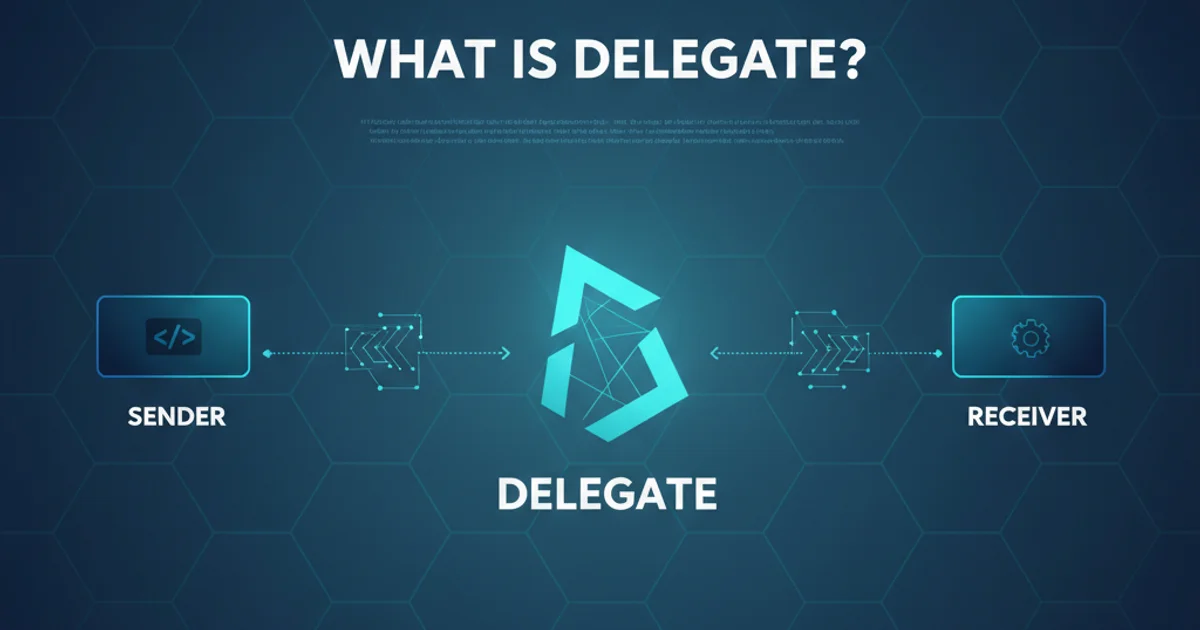What is Delegate?
Categories:
Understanding Delegates in Object-Oriented Programming

Explore the concept of delegates in OOP, their purpose, how they work, and their practical applications in event handling and callback mechanisms.
In object-oriented programming (OOP), a delegate is a type that safely encapsulates a reference to a method. Think of it as a type-safe function pointer. Delegates are fundamental to event handling and callback mechanisms, allowing you to treat methods as objects that can be passed around, stored, and invoked at a later time. They promote loose coupling between components, making your code more flexible and maintainable.
What is a Delegate?
At its core, a delegate defines a method signature (return type and parameters) and can hold references to any method that matches that signature. When you invoke a delegate, it executes all the methods it references. This capability is particularly powerful for scenarios where you need to notify multiple subscribers about an event or execute a custom action without knowing the specific method at compile time.
flowchart TD
A[Delegate Declaration] --> B{Method Signature}
B --> C[Method A (Matches Signature)]
B --> D[Method B (Matches Signature)]
C --"Assigned to Delegate"--> E[Delegate Instance]
D --"Assigned to Delegate"--> E
E --"Invoke Delegate"--> C
E --"Invoke Delegate"--> DConceptual flow of a delegate referencing and invoking methods
How Delegates Work: A Practical Example
To understand delegates better, let's consider a simple scenario where we want to perform different operations on a number based on a chosen delegate. We'll define a delegate type, create methods that match its signature, and then assign and invoke these methods through the delegate.
using System;
// 1. Declare a delegate type
public delegate int MathOperation(int a, int b);
public class Calculator
{
// 2. Define methods that match the delegate's signature
public static int Add(int x, int y)
{
return x + y;
}
public static int Subtract(int x, int y)
{
return x - y;
}
public static void Main(string[] args)
{
// 3. Create delegate instances and assign methods
MathOperation addDelegate = new MathOperation(Add);
MathOperation subtractDelegate = Subtract; // Shorthand syntax
// 4. Invoke the delegates
int resultAdd = addDelegate(10, 5);
Console.WriteLine($"Addition Result: {resultAdd}"); // Output: Addition Result: 15
int resultSubtract = subtractDelegate(10, 5);
Console.WriteLine($"Subtraction Result: {resultSubtract}"); // Output: Subtraction Result: 5
// Delegates can also be combined (multicast delegates)
MathOperation combinedDelegate = addDelegate + subtractDelegate;
Console.WriteLine("\nInvoking combined delegate:");
// When a multicast delegate is invoked, methods are called sequentially.
// The return value is from the last method in the invocation list.
int combinedResult = combinedDelegate(20, 10);
Console.WriteLine($"Combined Delegate Result (last method's return): {combinedResult}"); // Output: Combined Delegate Result (last method's return): 10
}
}
C# example demonstrating delegate declaration, assignment, and invocation.
event in C#, you are essentially declaring a special type of delegate that provides a controlled way for external code to subscribe and unsubscribe from notifications.Key Use Cases for Delegates
Delegates are incredibly versatile and are used extensively in various programming patterns and scenarios:
1. Event Handling
This is perhaps the most common use case. Delegates allow objects to notify other objects (subscribers) when something interesting happens (an event) without needing to know the specific types or methods of those subscribers. The publisher defines a delegate, and subscribers provide methods that match the delegate's signature.
2. Callback Mechanisms
Delegates enable you to pass a method as an argument to another method. The called method can then 'call back' the provided method at an appropriate time, often after completing an asynchronous operation or when a specific condition is met. This is crucial for asynchronous programming and custom sorting algorithms.
3. Generic Algorithms
Delegates allow you to write more generic and reusable algorithms. For example, a sorting algorithm can take a delegate as a parameter to define the comparison logic, making it adaptable to different data types or sorting criteria without modifying the core algorithm.
4. Command Pattern
In the Command pattern, delegates can represent commands that can be executed, queued, or undone. This decouples the object that invokes an operation from the object that knows how to perform it.
Action and Func delegates (built-in generic delegates) to simplify common delegate scenarios, reducing the need to explicitly declare custom delegate types for every use case.